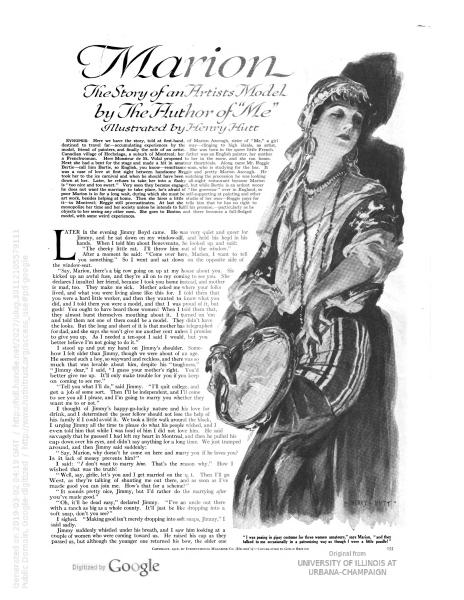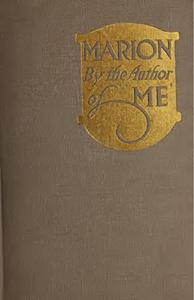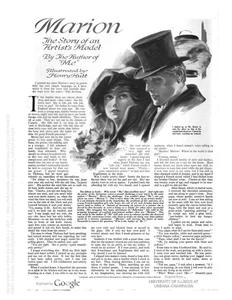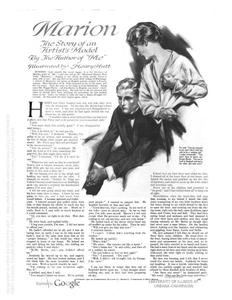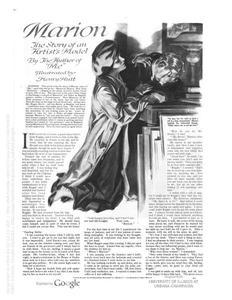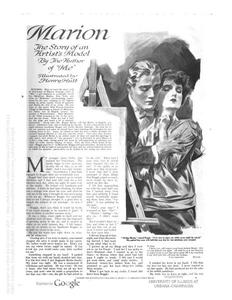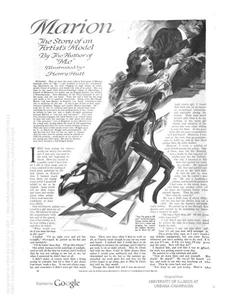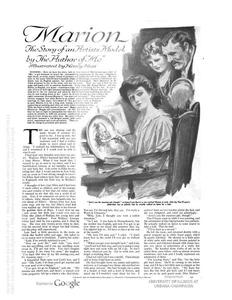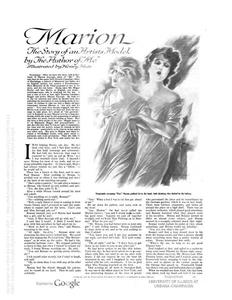June had come and I was filling the last of my engagements. There was not a single
other date in my calendar for the week, and it was Wednesday. I had filled only
two engagements the week before.
I was posing for three women. The work was easy, as they were amateurs and liked
to meet together and use the same model, and paint and have a social time. I was
posing in a gipsy costume, and they talked to me occasionally in a patronizing
way, as if I were a little poodle. One of them asked me if I wouldn’t like to
paint. I knew I could paint better than she could, but pretended to simper and
said:
“Oh yes, indeed.”
One of the women, with kind-looking eyes, smiled at me and asked if I managed to
make a living, and then the one who asked me if I would like to paint said:
“Oh, by the way, we won’t need you again, as we are all off the country.”
She added that they might be able to use me the next season, and I wondered dully
to myself whether I would need them when the new season came. A feeling of despair
was stealing over me—despair and recklessness.
The woman with the kind eyes who asked if I made a living I have since recognized
as the wife of one of our Presidents. I wish I had known her better.
Though I had so little work to do, nevertheless I was feeling languid and tired in
these days, and when I reached my room that afternoon I threw myself bodily down
upon my bed. I felt that I did not want to get up even to go out for my dinner. I
was lying there with my face buried in the pillow when Miss Darling called up the
stairs:
“There’s a gentleman to see you, Miss Marion.”
I jumped up and ran out into the hall. A short, dark man was mounting the stairs.
I thought at first he was a picture-dealer I had once seen at Mr. Sands’s studio.
“Miss Ascough?” he asked. I bowed, and led him to my room.
He said he had obtained my name from Mr. Sands and that he wanted to engage me as
a model for some decorative work he was doing.
He had seen me several times about the studio
157 buildings, and had
decided I was the type for this particular work. As he said the work would last
all summer I was delighted, and I thanked him fervently. Then he said:
“Suppose we have a little supper together somewhere.”
I was awfully sorry, but I had promised to help Miss St. Denis fix a waist she was
making. So I told this man I could not disappoint my friend. He said: “As you
please, then,” and was going, when I asked for his address. He stopped and
thought a moment, and then wrote something on a slip of paper and handed it to me.
He told me to come to work at ten the following morning, and, bowing, went. The
address was in Brookline, and as it was some distance out I planned to start early
to be sure to be there in time. After the man had gone all my lassitude vanished.
I felt like dancing and screaming, I was so relieved and happy. Here I was engaged
for six hours’ work a day for all of the summer. I rushed to tell the good news to
Rose St. Denis. She said:
“I tink it is too good to be true. It looks too easy. I tink he will want the
model to pose undrape’, ha! You will not do so yet?” as I shook my head, she
said with a nod: “You will make very poor living if you don’t do so, mon enfant. The artists have not enough to keep one
model in work in ze costume, and then there is so many doing the same ting.
Every girl—even ze frien’ of ze artist, she will pose in costume. The model
cannot get enough work to keep her, unless she is a friend of some one or maybe
she is complaisante to ze artist—yes. Only
when she pose in ze schools—see, she get ze work, so long as she have ze
belle figure. It is so. Now, which a model
prefer? Pose that way, starve—or perhaps be maîtresse to somebody—which is same ting,” she added to the
shrug, “as aller au diable!”
“Which would you prefer?” I asked her.
“Mais oui! Some funny question you ask,”
said the French girl. “It is because I love my Alfred” (Alfred was her
fiancé) “that I pose un-drape; for ze other mens; for bi-cause I pose comme ça I can keep myself good and pure for only
him. It would be more easy if I were not good. Do you not see, enfant? I pose and stand on my poor feet for three,
four and sometime nine heures a day—nine
heures when I do night work, and for zat I
get me fifty cent one heure. Ze bad girl she
get for very liddle time more moneys than I; but me? I keep me my reespect.
Yes—it is so. Soon my Alfred he will come from France and we will marry. Then,
enfant, ah! we will be happy like
cheeldren.”
Somehow, when she was speaking, this model who posed so freely looked like the
Virgin Mary, and I put my arms around her and kissed her. She said:
“Pauvre enfant! Me? I know eet is hard for you!
I have ze pity for you; but dat will not put ze food in ze stomach! Non! Soon you will see!”
I awoke happily next morning. I was going to start at good steady work. Now, I
thought, I would pay back Lu Frazer all I owed her, and I’d send mama money every
week, and Reggie’s letters should go unanswered. He had written me saying that he
was coming soon to Boston to bring me home, unless I returned myself. And I
thought I would buy myself a new hat and trim it with violets.
I went into the basement dining-room to get my breakfast, and the landlady put a
bill at my plate. It was for three dollars for meals I had had. I told her I would
pay her in a few days.
I had exactly five cents in my pocketbook when I started for Brookline, but I
intended to ask the artist to pay me a little in advance. They often did that, and
as I was to have steady work I was sure he would not object. I could not help
thinking of a remark of my father’s, that something always “turned up” and I
felt that my something had come in the nick of time.
It was three-quarters of an hour’s ride to the street in Brookline he had marked
on the slip. I got off at last, and walked down the street looking at the numbers.
I went up and down twice, but I could find no such address. I went to nearly every
second house on the street, but no one knew the name I inquired for, and the clerk
at the drug-store where I also inquired said there was no such man in the
vicinity. Again and again I looked, and then a sick sense of apprehension stole
over me, and I began to realize that I was the victim of some cruel hoax.
What in heaven’s name was I to do? I had no carfare even, and it was too far to
walk. I wandered about distractedly, and then I finally resolved to get on the
car, and when the conductor should ask for my fare, I would pretend I had lost it.
Then I thought, “even if he puts me off, I will be that much nearer home, and I
will try another car.”
So I got on a car, but I suffered the shame of a cheat when the conductor finally
came up to see me, and I almost cried as I pretended to search through my empty
pocketbook. Then I heard the conductor’s voice. He was a big, red-faced Irishman,
with freckles on his face, and he grinned down at me:
“Aw, dat’s all right, kid!” he said, and taking a nickel from his own pocket,
he rang up my fare. When I was getting off, I said:
“Thank you! I’ll send it back to you, if you give me your name.”
He laughed. “Dat’s all right, kid,” he said, and then leaning to my ear he
added: “Say, do you want another nickel, sissy?”
I borrowed the dollar from Evans, the student who was a friend of Jimmy’s. I
bought the morning papers, and scanned the
190 columns of
advertisements. I was determined to look for some other kind of work, yet I
realized that I was a
“Jack-of-all-trades and master of none,” unless it be
that of the model. I found one advertisement that seemed to be pretty good:
’Wanted: A smart, pretty young lady for light, easy work. Experience not
necessary.’
I started down to answer that advertisement at once. The address was in the old
building on Washington Street and there seemed to be all kinds of businesses
carried on there. On the door of the place I was to apply was some name, and the
word “Massage.” I had a dim idea what massage meant. I associated it in some
way in my mind with illness. I pushed the bell, and the door was quickly opened. A
stout, matronly woman stood smiling at me.
“Come in, dearie,” she said, as though she were expecting me.
I found myself in a room that looked like the average boarding-house parlor. It
was stuffy and dark. The woman sat herself down in a rocker, and she was still
smiling at me
“I came in answer to the advertisement. What do you require me to do?”
Patting me on the arm, she said:
“Easy, easy, dear. Don’t talk so loud. It is massage work, dearie.”
“I can’t do it,” I said, “but I might be able to learn.”
She kept on grinning and winking at me, and I don’t know why, I suddenly felt
terribly afraid of her. I said tremulously:
“Will I have to wear aprons?”
She got out of the rocking-chair and poked me in the side.
“Now, dearie, if you are really a good girl, I don’t want you to come at all.
I’d rather have a young married lady. I had a sweet little married lady before,
but her husband got on to us and—”
I had begun to back toward the door, and with my hand behind me I found the knob.
I ran out into the hall, and down those stairs as quickly as I could get. Oh, how
good the air did seem when I found myself at last on the street.
When I got to my room, I found a note on my table. It was from Miss Darling, and
was as follows:
’Dear Miss Marion:
‘I don’t want to press you, but could you let me have the rent? I would
not bother you, but I have expenses to meet, and even if you could let me
have a part if you cannot let me have it all, I would be obliged.
‘C. DARLING.’
There was a letter, too, from Reggie. I opened it with my hatpin and oh! I think
if I could have pierced Reggie instead of that letter, just then, I would have
liked to do it.
’Darling Girlie:
‘I met your sister Ada on the street, and she tells me you are doing
awfully well in Boston with your painting. I hope, however, you are not
forgetting your old sweetheart. Ada tells me you are coming home this
summer. Darling, I shall try to arrange to go to Boston, and we will come
back to Montreal together. I am longing for the moment when I can hold my
own little Marion in my arms again, and tell her how much I love her.
‘Everything’s going my way lately, and you’ll see me a Q. C. before many
years have passed.
Your own,
REGGIE.’
Somehow I blamed Reggie for all I had suffered, and as I stared out at the
darkening night descending upon the streets, I muttered to myself:
“Now it is your fault that I am compelled to pose in the way I hate!”
It had come to this at last. There was nothing else for me to do, and Miss Darling
must be paid. She had been so good to me.
As I went out, I knocked at Miss Darling’s door. She put out her head and I
said:
“Dear Miss Darling, it’s all right. I’m going to pay you in a few days.”
She said: “All right, dear, I know you will keep your word.”
Yes, I would keep my word! I was on my way to Miss St. Denis to tell her what I
was now willing to do. I found her in, but she was not feeling well. She had been
posing at a class the previous night, she told me, and also three hours in the
afternoon.
“See my feet,” she said, thrusting them out, “Mon
Dieu! they are so sick. All ze night I have put me some vaseline
and it is no good. They are grown beeg again.”
Her poor bare feet were badly swollen. I begged her to let me bathe them in hot
water. Mama always bathed our feet in hot water when we had colds or our feet
hurt.
“Bien!” she said. “Do so, enfant, if you wish, but it is so hard to get hot
water in zese boarding-house. Ah! very soon I will have dat little house of all
my own, and den, you will see, enfant, what it
is to be tres happy!”
She sighed, as if she were inexpressibly tired, and lay there with her dark eyes
closed, and her beautiful soft dark hair all about her lovely face, and I thought
to myself again: “She looks like a picture of the Virgin,” and I felt sure
that although she was just a poor model, she was pure and good like the Virgin.
She opened her eyes after a moment and smiled at me, and she said:
“When I have my little house, enfant, then
always ze water will be hot. There will be ze gas on ze stove, and it will give
beeg flame, and me? I will have plenty for heat my water. Here, me, I stand and
hold for eternity ze little pot to make some water hot on ze little gas-jet. It
is all stuff up full!” and she closed her eyes again.
“Wait a minute,” I said: “I’ll go and ask your landlady for hot
water.”
I found my way down to the basement, and very politely I said to the landlady:
“Miss St. Denis has a very bad foot. Will you be so kind as to let me have a
pitcher of hot water?” She snapped back at me: “I guess I give my roomers
more hot water than they pay for. Does she think she is paying hotel
prices?”
In a begrudging manner she poured me out half a pitcher full from the kettle on
the range. Thanking her, I started to carry it up, but a loose piece of carpet at
the foot of the stairs caught my feet. I slipped and all my precious hot water was
lost. The landlady had picked up the pitcher, which fortunately was not broken,
and when she saw me crying she began to laugh uproariously, and seemed to be
suddenly good-natured, for she refilled the pitcher.
I bathed Rose St. Denis’ feet, and made her comfortable, and she thanked me
sweetly and seemed to be grateful. I sat beside her bed for awhile, smoothing her
forehead. She was not really ill, just tired out. Presently I said:
“Now the time has come for me to pose as you do, or as you say, starve or go to
the devil.”
She opened her eyes with a start, and she said: “Merci! But you do say things so suddenly, enfant. You are funniest girl. You say some time ze ting I would
not dare to speak, or if I did I would have to confess to my priest; and den
you are afraid to do some tings zat is nutting wrong, and you mek one beeg fuss
for dat.”
She sat up in the bed, with her knees drawn up, and regarded me with the
benignant, tolerant glance of a young wise mother. She could understand my
viewpoint in regard to posign undraped, but she believed I was simply wrong and my
stubbornness in the matter had always puzzled her. She did not waste any time on
pitying me now. On the contrary she urged me to do the work.
“Now you have come,” she said, “at a very good time for me. I am not able
to go to dat night class, and I have made engagement for all dis week. You will
take my place,
voilà!
first you will tell him you have pose bi-fore, dat you
have ze belle figure—yes, you must say dat. If
necessaire you will show him.” As I
shook my head, she nodded at me and said: “Yes, yes, you will do dat, if
necessaire. Mebbe he will not require. You
must not tell him that you have not pose bi-fore in dat altogedder. He will
tink you ‘greenhorn,’ as you say, den. Tell him you are one professional model,
and dat you are fren’ to Rose St. Denis, and dat you will tek my place. I tink
he will be satisfy. You look liddle bit like me. Like you are liddle sister to
me. Yes, dat is so.”
She patted my hand, smiling comfortingly at me. Then she went on with her
instructions.
191 It was only Tuesday, and I would have five evenings’
work and earn seven dollars and fifty cents. I would probably also be engaged for
the following week, and for the day classes of the summer school. A model as much
in demand as was Rose St. Denis sometimes got steady work for nine hours a day.
Three in the morning, three in the afternoon, and three at night. She assured me
that I would be soon in demand as she was, perhaps more so, since I was younger
than she.
The seven dollars and fifty cents I felt would be a godsend at this time. I would
be able to pay the boarding-house woman. She had stopped me on the street only
that morning and said:
“If you don’t pay me, Miss Ascough, you will have no good luck.”
Then there was Miss Darling. I must keep my word to her. Moreover, Ada had been
writing me urgent letters insisting that I should send something home, for
Wallace, Ellen’s husband, was very ill, and of course, no help was coming from
them now. As I looked at Miss St. Denis, I thought to myself that after all it
could not be such dreadful work or she would not do it. She seemed to me the
embodiment of sweetness and refinement, and I could not imagine her doing anything
that was gross or impure. I remembered the time I saw her posing before the class,
I had not felt revolted in the way I had that time when Lil Markey had skipped
about the Count’s studio. The amateur model, Lil, had been brazen. The
professional one was seriously doing her honest duty.
Miss St. Denis was lying back among her pillows with her white hands—the hands Mr.
Sands had said were the most beautiful in America—clasped at the back of her head.
She was watching me, and I suppose she knew I was turning the matter over in my
mind, and I do not doubt but what she realized somewhat of the struggle that was
wrestling in my heart. After a while she said:
“Enfant, pass me dat bottle on ze dresser.”
I did so, and she pressed it back into my hand.
“See,” she said, “it is ze spirit that will give you courage. I will give
it back to you. The moment that you deesrobe, tek one good long drink, and den,
enfant, you will forget dat you have no
clothes on, and dat tout le monde, he is look’
at you. It will be joost like little dream. Dat firs’ time, also, I am feel ze
shame—but soon it pass—and it is all forget. Courage, enfant!”
“No, no, Miss St. Denis. Oh, I can’t do it! I can’t!” I began to cry, and
then she seized hold of my hands fiercely and pulled herself up in bed.
“Ah, you are ze coward—renegade. You will not help me.”
“Oh, Miss St. Denis, I might just as well go to the dogs completely. Oh, I can
never, never do it! Oh, if my people found out, I would be eternally disgraced
and Reggie—he would never speak to me again. Then, surely, he would
never, never marry me, and there would go my last hope.”
“You are hysterique,” she said gently. “I
tink you have not eat so much—yes?”
I told her I had had my dinner, which was not true, and after awhile, when I had
dried my tears and was feeling more composed, she resumed, just as if I had not
said I would not do it.
“It is not so hard as you tink. You will yourself undress behind the screen that
they provide, wiz one chair for you to rest upon. Nobody look at you when you
take off dose clothes. Dere also is one wrapper for you to slip on, and when
the monitor he call: ‘Pose!’ you will walk wiz ze wrapper on to ze model stage,
and only den you will drop ze wrapper. Listen, enfant! If you have take dat dreenk I am tell you ‘bout, you will
forget dat it is you. You will say to yourself: ‘Dis is not me. Dis is jus’
some statue—so many lines for dem to draw and paint, to make some peecture. Ze
real me, I am lef’ in my clothes dat are behind dat screen. VoiláVoilà enfant?”
I was beginning to get her spirit, and I said:
“Why, yes, I do see. It’s like acting, isn’t it? I will forget it
is I.” I tried to laugh and added: “I will say: ‘O Lord, have mercy on me,
this is none of me!’ That’s an old Mother Goose rime, Miss St. Denis.”
Because I could see she had fatigued herself on my account, and it was my turn now
to comfort and reassure her. I put my arms around her and hugged and kissed her.
Tears came into her eyes, and she murmured:
“Pauvre petite enfant. You look like ma petite soeur!”
I went directly from Miss St. Denis to the school. I asked to speak to Mr. Lawton,
the master, and he came out to the little ante-room and looked at me sharply while
I spoke. I knew my voice was trembling, but I said as bravely as I could:
“I have come from Miss St. Denis. She is ill; but I will take her place.”
“You have posed before?” he asked, his eyes seeming to scan me from head to
foot.
“I am a professional model,” I answered.
“Hm! Yes, I think you will do.”
I was behind the screen. I had disrobed and I was wrapped up in the wrapper which
I found to be very dirty. I wondered how many girls had wrapped it about them.
I could hear the students entering the class-room. I peeped out, and already there
were about fifteen men of various ages, and there were about thirty easels and
stools. More students were coming in. There was one elderly man with white hair,
and two young boys, one only about thirteen. He looked like my little brother
Randle. I began to redress. I could never go out before those men and the little
boy! Merciful heavens, no!
Then I remembered my promise to Miss Darling. I thought of my father, who was ill,
of Ada’s insistent demands. Of my empty pocketbook, and then I thought of the
bottle that Miss St. Denis had given me. I undressed again. I heard a voice
saying:
“Where’s the model?”
Then the voice of the monitor called sharply: “Pose! Pose, please!”
I drained that bottle dry. I stepped from behind that screen. I walked up to the
platform, and I flung off the wrapper. I heard a voice saying, as from a
distance:
“Take some poses,” said the voice. I obeyed.
I stood there immovable. I felt like a slave who was to be burned as an offering
by some savages. It seemed as if I were turning to stone. There was a vague
ringing in my ears, and then, as Miss St. Denis had foretold, I forgot that class.
I did not see it. I was back in Hochelaga, and Charles was dragging me along on a
sleigh. The snow was thick on our clothes. Mama was brushing it off. Charles was
pulling off his mittens and I heard him say to mama: “Mama, I’ll never take that
Marion with me again. When we pass the Catholic store with all those images of
saints she makes me so ashamed. She will stop to look at the naked Jesuses. I
couldn’t make her come away.”
“Rest! Rest!”
The voice of the monitor! I awoke. Mechanically I pulled the wrapper over me.
Somebody said:
“The model is crying.”
I walked behind the screen. My head still swam, and I still saw dim visions of my
home. I seemed to have been there only five seconds—it was five minutes—when again
came the command:
“Pose!”
Now I felt angry. I stepped on that stage, and once more I threw off the wrapper.
Somebody said:
“Put the left foot further back.”
My anger was mounting. The dream had all vanished and I was conscious only of a
vague fury. I know not why, but I hated all of those men. They were looking at me,
I thought, like cruel tormentors. I wanted to hurt them all, as they were hurting
me. Their intent looks, some with their eyes narrowed to see better, others
measuring me with a plumb string, seemed to be mocking at my pain. Somebody
said:
“She looks cross.”
I seized the wrapper, and savagely I wrapped it about me. I ran for the screen,
shouting:
“Oh, you fiends! You beasts! You shall not torment me any more!”
Again I was behind the screen, and with mad, hurrying, fumbling hands I was
dressing myself. There was the scraping of boots and stools, and several whistles
from the class-room, after the first silence.
Then the master came behind the screen:
“What does this mean, Miss Ascough?” he demanded. I was crying bitterly.
“Did anyone say or do anything to offend you? If so, I’ll put him out of the
class.”
I said: “Oh, yes, they are not gentlemen. They all stared at me and talked about
me.”
There was an indignant murmur of denials from the students. Mr. Lawton put his
head over the screen and I saw him wink to the students. Then he turned to me and
said in a coaxing voice:
“Now, now, be a good girl. We want you to finish the pose. If anybody dares to
be rude to you, you just tell me about it, and I’ll put you out.”
“No, no,” I said. “I’ll not do it again.”
192
“Now, please, won’t you for my sake? It’s instruction night, and I am here to
give criticisms. Please resume the pose, like a good girl. Yours is just the
kind of figure we need. Come, now.”
“No—no—I am through forever!”
I was all dressed. Oh, my beloved clothes! The teacher was now thoroughly
provoked.
“What do you mean by taking an engagement and wasting our time like
this?”
“I don’t know,” I answered, and I ran out of the room.
I owe an apology to that class.
We were all sitting around the big hall stove, and papa said:
“Put your feet on the fender, Marion, and get them warm.”
Mama was feeding me with a big spoon of ice-cream, which Reggie tried to snatch
away, and then he would throw red-hot coals in my face. Screaming:
“Reggie! Reggie! Stop! Stop!” I woke up.
A man was sitting by the bed in my little room, and he was holding my wrist. I
recognized him as a young doctor who had attended Miss Darling when she had the
grippe. He had straight blond hair and a gentle expression. Standing by him was
the girl who had taken the big room on the first floor a few days before. I had
noticed her, because she dressed so well and had so many visitors. Now she was
holding some ice on my head, and I heard her say to the doctor that she had just
put a hot-water bag on my feet. She was not beautiful like Rose St. Denis, for she
was short and stout, but she had a large, generous mouth, and when she laughed she
showed the most beautiful teeth, and she laughed a great deal, so that one could
not help liking her. “How is she, doctor?” she asked, and he replied:
“She ought to stay in bed some time. Her temperature is a hundred and five. I’m
afraid of her being left alone. Has she no one to take are of her?”
“No, no,” I moaned weakly. “I have nobody. They are all dead.”
“Who was that ‘Reggie’ you were calling for?” asked the girl, and I said:
“He’s dead, too.”
My eyes felt very heavy, and I could not keep them open, I heard their voices as
if in a dream.
“My! but she gave us a scare,” said the girl: “We were just going out of
the front door last night, to get a bite of supper over at the Plaza, and as we
opened the door she was coming up the front steps, and she suddenly threw out
her hands as if she were drowning, and would have fallen down the stairs, had
not Al caught her.”
There was a long silence, and then I heard her voice again—she was stroking my
hand.
“Poor girl! What a pretty little thing she is.”
I put my cheek against her hand. Somehow it seemed to me natural that she should
be good and kind to me. Then the doctor said: “I will have her moved to the
hospital. This room is too small, and she will need the best of care.”
“Why can’t I care for her?” asked the girl suddenly. “I can do it! Oh, you
don’t believe me, eh?” I heard them both laugh, and she said:
“It’ll be lots of fun. To begin with, you carry her down to my room.”
“Do you really mean that?” I heard him ask, and her reply: “Why, of course
I do.”
I did not say a word. I did not care much what they did to me, and there seemed to
me no reason why I should not be cared for by this stranger. I suppose it was my
weakness, but perhaps it was the consciousness that I would have done the same in
her place. Poor girls instinctively depend upon each other in crises like these.
And then this girl—Lois Barrett was her name—had a jolly way that made even the
most trying service seem like a game to her. She acted as if she really enjoyed
doing something that another person would have considered a trial. She kept
saying: “It’ll be all kinds of fun. Come along, doctor, let’s get her right down
now. Can you do it?”
“Easily,” declared the doctor.
“Ah!” said she, “It’s fine to have big broad shoulders. I wish I were a
man—like you.” She added the last two words softly, and the doctor chuckled.
They wrapped the blankets around me, and the doctor lifted me up in his arms and
carried me down the stairs. I was so weak that even this slight movement affected
me, and I fainted.
I must have been even worse than the doctor thought, for I did not know anything
more for a long time; then, one day, I opened my heavy eyes, to find myself in a
big sunny room, and dreamily I watched Lois Barret hovering over me like a
ministering angel. Then, in the evening, I have a dim remembrance of the doctor
standing in the window, and putting his arm around Lois, and it seemed to me he
was kissing her. I called:
“Oh, I am not asleep. I can see you.”
They both laughed, and Lois came over and gave me something to swallow, and as I
dropped asleep they seemed to grow into one person.
“Lois, are you in love with Doctor Squires?”
She burst out laughing.
“I’m in love with everybody and everything. Here, lie back there.”
I was to sit up in bed that afternoon, and the following day in a chair. I had
been ill two weeks.
“Now,” said Lois, “I have to go down-town on some business, and I’ll be
gone two hours. If you want anything just knock on the wall like this,”
giving me a brush, “and Billy Boyd in the next room will come in, and if it’s
something he can’t do himself he’ll call Miss Darling.”
She kissed me, and looking fresh and radiant she went on out.
Billy Boyd roomed with a friend in the next room to Lois. His room-mate was a
clerk in a department-store, and Billy was a cable operator. He worked at night.
Reggie would have called these boys “common Yankees.” I knew how much better
and in every way superior they were to Reggie, whose grandfather was a duke or
something like that. These boys would run errands for Lois if she knocked on their
wall for help, and when I was most sick and helpless Billy even came in and helped
Lois when it was necessary to lift me. Lois treated them as if they were girls,
and they treated her as if she was a boy. It was a revelation to me, as in Canada
and in Europe the simple friendship between men and women is not known as in the
United States.
Then there was big Tim O’Leary. He was a bartender in a nearby hotel. He had a
room in the basement of what had once been the dining-room. He used to knock at
the door and ask in his big voice, which sounded for all the world like a
foghorn:
“How’s the little Canadian girl?”
He would send over the waiters from the hotel where he worked with all sorts of
stuff that a sick person was not allowed to eat, big platters of lobster salads,
chicken salads, club sandwiches, wine and beer. Lois told him I could only have a
little broth, and then Tim sent over a big pitcher of rich soup. Lois tasted it,
and then fed a spoonful of it to the doctor, and they both laughed. Then she went
to the boys’ room and knocked, and they were glad to get the good stuff.
Tim was a man of immense stature, and he would tell us all kinds of stories of his
experiences when he was a coalheaver in New York and the fights he got into, and
the times he was arrested, and always got off with a light fine. Dr. Squires
called him a “rough diamond,” and, much-sought-after society man as Doctor
Squires was, he liked to go off with Tim O’Leary, and have a drink and “chin”
together. I did admire the doctor for that, and I remembered how Reggie had been
ashamed and angry with me because I had spoken to the conductor on the train.
There was a knock at the door, and when I called “Come in,” the door was
cautiously and softly opened, and Tim thrust in an inquiring face.
“How’s yoursilf?” he inquired, in a big whisper.
“I’m very well, thank you, Mr. O’Leary.”
“And Miss Barrett, how’s hersilf?”
“Oh, she’s well too. She had to go out for a couple of hours.”
“Sure, then, I’ll stay and take care of you mesilf,” said Tim. “I’m dead
tired. Standing behind a bar is hard on the feet; so if you don’t mind, I’ll be
taking off my shoes and stretch mesilf out for a rest.”
I assured him I would be very glad to have him do it. The big man worked sometimes
ten and twelve hours at a stretch, and it was so quiet and peaceful in this room I
felt the rest would do him good, just as it was doing me.
So Tim stretched himself out on the couch, with his shoes off, and fell
asleep.
